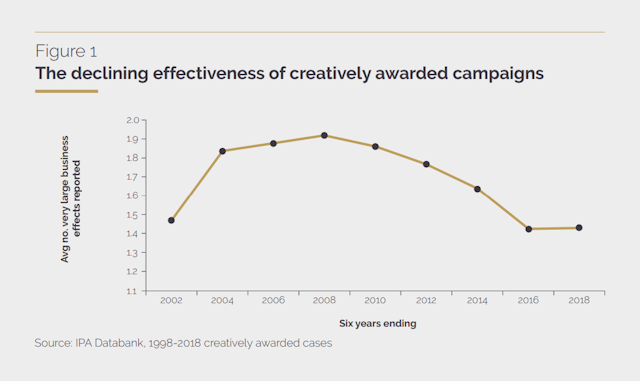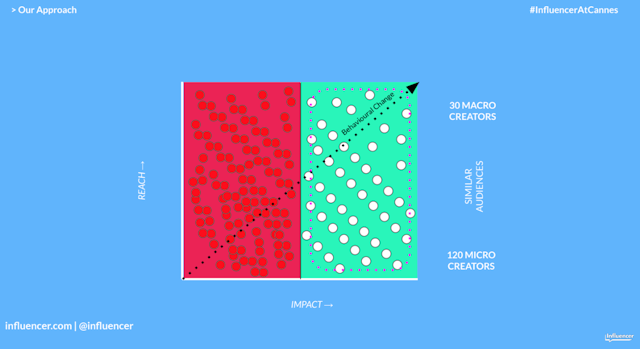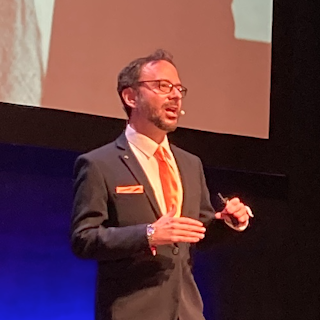The brand purpose hypocrisy at Cannes Lions
Some things you can see from only 1,700 miles away – like how the ad executives gathered at Cannes Lions last week talked a lot about brand purpose but completely ignored an actual opportunity to help the world.

I was unable to attend the festival, but I followed the proceedings from Tel Aviv by reading The Drum’s full coverage and obtaining in advance the prepared speeches and presentation decks of sessions that had piqued my curiosity.
‘Brand purpose’ was a popular topic. Maithreyi Jagannathan, P&G’s associate marketing director for healthcare, and Ajay Vikram, the chief creative officer of Publicis Singapore, discussed an ad campaign featuring a transgender Indian mother and a girl with a rare skin condition.
Jimmie Stone, Edelman’s chief creative officer for New York and Latin America, unveiled a five-step guide to building a brand with purpose. The Body Shop’s global head of activism, Jessie Macneil-Brown, joined a Unilever global sustainability lead, Dorothy Shaver, and Tony’s Chocolonely’s head of marketing, Pascal Van Ham, to talk about the future of brand activism.
Netflix writer and producer Kenya Barris, Wieden+Kennedy chief creative officer Colleen DeCourcy and TBWA chief executive officer Troy Ruhanen touched on brand activism in a hyper-charged society.
At AdConnect’s beach, the ACT Responsible association (Advertising Community Together) presented ‘tributes’ to the best in advertising around themes such as the environment.
No money where their mouths were
But see what happened when someone actually wanted to do something real about the environment. An activist group named Extinction Rebellion exposed the feel-good sentiments as utterly hypocritical.
The organisation – many of whose members are reportedly ad industry veterans – issued an open letter last month calling for marketers to use their communications expertise to prevent environmental disaster by fighting climate change on behalf of brands, driving sustainable efforts and cutting waste.
Then, on Wednesday afternoon, Extinction Rebellion crashed Cannes Lions and demonstrated at Facebook’s beach the following day.
William Skeaping, a former creative strategist at McCann London and a reported prominent player in the organisation, had also been meeting festival attendees to persuade them to join its sustainability agenda.
The marketing elite at Cannes Lions had a real opportunity to help the world significantly. And what happened? Fourteen Extinction Rebellion activists were arrested. So much for putting their company dollars where their mouths were.
No one Skeaping met was reportedly interested. He tweeted: "Came hoping we could get the advertising industry to help tell the truth about the climate and ecological emergency but now have a sinking feeling that we're totally fucked."
Brand purpose is actually a myth
It is not just the hypocrisy. It is not just advocates of brand purpose not wanting to save the world when a lot of actual money is on the line. ‘Brand purpose’ is a myth based on bad analysis – and rarely helps to sell stuff anyway.
As The Choice Factory author Richard Shotton has noted, the brand purpose craze started with former P&G chief marketing officer Jim Stengel’s 2011 book Grow.
Stengel selected the 50 brands with the highest loyalty or bonding scores in Millward Brown’s database and found that they all had a desire to improve people's lives. Their stock prices together – if collected as an index – would have also grown by 393% over the prior decade compared to a 7% loss for the S&P 500.
But Shotton correctly pointed out that some of the selected brands are private companies or do not have a share price. Stengel’s logic was also a perfect example of survivorship bias – he pre-selected brands that had already been successful and did not research whether all uses of ‘brand purpose’ had been successful.
“Stengel’s finding, if you restate it at its most basic, is that brands that feature in the top 0.1% of companies have performed well in the stock market. That’s circular logic,” Shotton wrote. “Because advertisers fervently hoped that the theory was true, they forgot to check whether it was. They have succumbed to a collective bout of wishful seeing.”
Is it any surprise, then, that US social impact consultancy DoSomething Strategic found in May that only 12% of people aged 13-25 had correct top of mind associations between brands and their individual social causes?
Location intelligence company Gravy Analytics also reported that public stances had not led to increased store visits, and other findings were counterintuitive. Conservatives were 13% more likely than liberals to visit pro-environment outlet Patagonia. Liberals were only 3% more likely than conservatives to visit Ben & Jerry’s. Conservatives were 8% more likely than liberals to visit Starbucks.
The problem is that people tell pollsters they want brands to join causes to help the world. (Who would say ‘no’ to that?) But that sentiment rarely translates into those people buying more stuff. (Remember David Ogilvy: “People don't think how they feel, they don't say what they think and they don't do what they say.”)
Paddle Consulting co-founder Brian Millar once put it perfectly: “Purpose is something you believe, not something you make up one day as a marketing strategy.”
Still, there is one effective use of brand purpose: recruitment, not marcom. Warby Parker originally advertised it would donate a pair of eyeglasses to someone in need for every sale. But no one really cared. Then, the company changed direction.
“For our 1,800 current employees and for people that we're recruiting, we lead with social mission,” co-founder Neil Blumenthal told Inc. “That's the number one reason people want to come work for Warby Parker.”
Every time I have talked with Facebook employees, their faces light up whenever they discuss the company’s stated goal of ‘connecting the world’. Say what you will about the social platform, but the mission has indeed inspired people.
Here are real brand purposes
Now, I do have a few suggestions for companies that want to help the world with a real brand purpose.
Agencies, stop being glorified sweatshops. US companies, give as much paid vacation time and parental leave as the rest of the world. Employers, stop cramming workers into soul-destroying open office plans.
YouTube, stop your algorithm’s spreading of far-right propaganda. Facebook, stop polarising society before it is too late for your company. Men, stop treating your own female employees terribly while producing hypocritical pro-woman advertisements.
And above all: tech companies, pay your fucking taxes.
After all, Unilever’s new chief executive, Alan Jope, was right at Cannes Lions when he encouraged the industry to stop rewarding hypocrisy. He said marketers should avoid ‘woke-washing’ and reject campaign briefs from brands that do not ‘walk the talk’.
On LinkedIn Pulse last week, Boston Content executive director Katie Martell also separately criticised brands for ‘rainbow-pandering’ during LGBT Pride Month every June. She said they “exploit LGBTQ rights in their marketing without meaningful action at their organizations or in the greater world.”

If the ad world at Cannes Lions truly cared about brand purpose, it would have sided with the Extinction Rebellion protesters – at whatever the cost to their profits. As one activist said during a panel at The Drum Arms: “If there's no planet, there's no profit.”
I have a challenge for all chief executive and chief marketing officers. If you truly believe in brand purpose, share this column from both your company and personal social media accounts, tag me and The Drum, state that you will join Extinction Rebellion, implement the group’s recommendations in your companies and refuse to take on clients or partners that will not do the same.
I’m waiting.
The good stuff at Cannes Lions
But not all at Cannes Lions was hypocritical or otherwise useless.

For a few years, the online group Sleeping Giants has been targeting companies whose ads appear in far-right news outlets to encourage them to stop sponsoring hate.
I once encouraged Amazon, Facebook, Google and Taboola to do the same, so I was proud that they won a Gold Lion in the new Social and Influencer category. But Sleeping Giants founder Matt Rivitz was not entirely happy at Cannes Lions.
“There must have been a thousand talks on diversity and inclusion but not a lot of action,” he wrote in a thread on the group’s Twitter account. “Brands and agencies are still woefully behind in this regard. If they truly believe it, they will stop advertising on racist, sexist shows and websites while adjusting their hiring.”
“The mere fact that Cannes allowed me to speak about the issues of ad responsibility and actually awarded Sleeping Giants with a Gold Lion (that’s good) means that the industry is waking up to its problems and understands there needs to be a larger discussion around it.”
McKinsey wants to help CMOs increase their clout

McKinsey & Company presented how chief marketing officers can increase their influence among other top executives. The study found that the solution is to have a CMO who is a ‘unifier’ rather than a ‘loner’ or ‘friend’.
“These CMOs are masters at fostering cross-functional collaboration,” Jason Heller, partner and global lead of digital marketing operations and technology practice at the firm, said in prepared remarks. “They ensure that marketing has a clearly defined role in the eyes of C-suite peers. They adopt the language and mindset of other C-suite executives, and they articulate how marketing can help meet the C-suite’s needs.
“They also establish mutual accountability and a shared vision with other executives. They have a seat at the table when critical decisions are made, have broad P&L responsibility and are often involved in defining the company’s strategy.”
McKinsey released the major findings in a detailed report. Elsewhere, British marketing consultant Samuel Brealey recently wrote a related and thoughtful essay on how marketers need to ‘grow up and talk to finance’.
The IPA issued two new important studies

The UK’s Institute of Practitioners in Advertising (IPA) unveiled a new study on ‘the crisis in creative effectiveness’ stating that the campaigns winning creative awards have also become increasingly less effective at selling. I’ll leave it to The Drum’s readers to think about the implications.
Further, the IPA also reported on a ‘board-brand rift’ that stems from most business leaders rating themselves as average to poor specifically in brand building. These two new findings follow my recent, exclusive publication in The Drum of Les Binet and Peter Field’s IPA-based research on the most effective practices in B2B marketing.
How influencer marketing can be more effective

Ben Jeffries, chief executive officer of the platform Influencer, discussed his view that many in the industry have become sceptical of the practice because they are ‘doing influencer marketing wrong’.
“Advertisers are understanding the importance of social media for raising awareness and promoting products and services,” he said in prepared remarks. “But it’s only the minority who are using data properly and are adopting techniques that trigger emotional connections.”
Jefferies explained that many influencer marketing companies sell with focuses on high levels of reach without much consideration into whether that quantity also brings quality. Specifically, he said influencer marketers need to move away from thinking about followers, engagement, and shares.
“Stop looking at the numbers based on volume, and flip the model to note that the smallest numbers are actually the most important as these show the values of the next stages in the marketing funnel around consideration and intent,” he said.
Based on my prior in-depth research into influencer marketing, I agree.
The Promotion Fix is an exclusive biweekly column for The Drum contributed by global keynote marketing speaker Samuel Scott, a former newspaper editor and director of marketing in the high-tech industry. Follow him on Twitter. Scott is based out of Tel Aviv, Israel.

